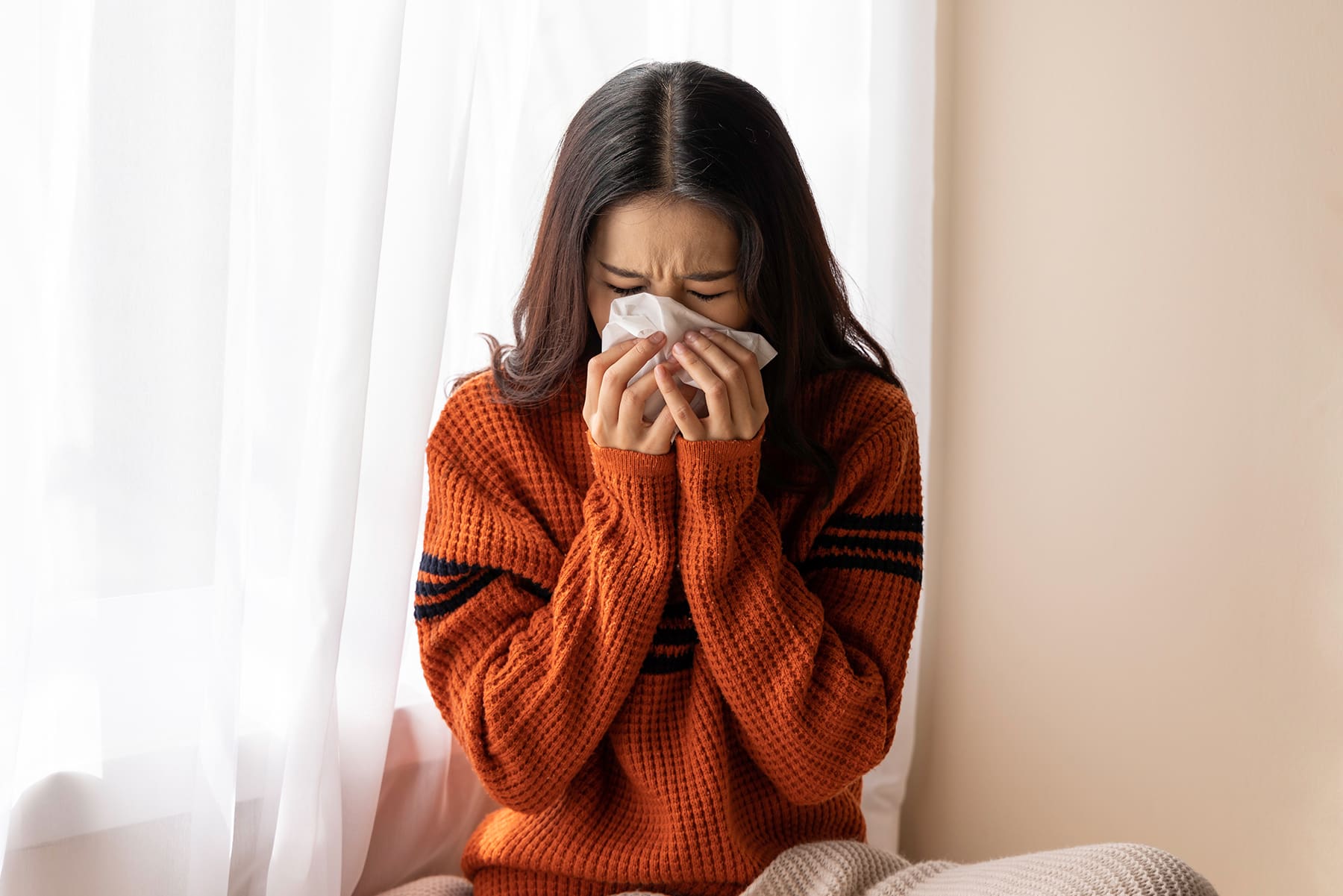Reviewed By Blake Gilliam, CRNP
Reading Time: 5 minutes
As summer fades and the vibrant colors of fall take over, it is easy to think the days of sneezing and runny noses are behind you.
Unfortunately, fall is a peak allergy season. If you find yourself with a stuffy nose, itchy eyes, or a scratchy throat as the weather cools down, you may be experiencing fall allergies.
In this blog, we will give you practical tips for managing fall allergies, explore common causes, and share how allergy testing and treatment at Madison Integrative Medicine can help you find relief and enjoy a healthier autumn.
Table of Contents
Key Takeaway
Fall allergies can be just as bothersome as summer ones, but with the right strategies—such as monitoring pollen levels, managing indoor allergens, and exploring treatments like allergy testing and sublingual immunotherapy—you can enjoy a symptom-free autumn.
Understanding Fall Allergies
Fall allergies are just as troublesome as those in the spring, often triggered by different allergens.
When the late summer transitions to fall, the blooms of summer plants may fade, but fall plants begin releasing pollen. Some of the most common culprits of fall allergies in the United States include:
- Ragweed pollen: The biggest allergy trigger in the fall. Ragweed can release grains of pollen that travel hundreds of miles.
- Mold spores: Mold growth often happens in damp areas, including piles of wet leaves or indoor places with high humidity.
- Dust mites: These year-round allergens can become more problematic in colder weather when windows are closed and the air conditioner is turned off.
Common Symptoms of Fall Allergies
If you are unsure whether your symptoms are allergy-related, note these common symptoms:
- Runny or stuffy nose
- Nasal congestion or nasal drip
- Itchy nose, eyes, or throat
- Sneezing or coughing
- Sore throat
- Shortness of breath, particularly if you have allergic asthma
Note: Do not confuse allergy symptoms with the common cold or COVID-19 symptoms. If you are experiencing severe symptoms or shortness of breath, consult with a healthcare provider immediately.
Practical Tips for Managing Fall Allergies
There are many ways to manage fall allergies effectively. By following these simple tips, you can reduce your exposure to allergens and alleviate seasonal allergy symptoms.
1. Monitor Pollen Levels
Check weather reports regularly for ragweed pollen levels and mold spore counts. On high-pollen days:
- Limit outdoor activities, especially during peak times (mid-morning to afternoon).
- Keep windows closed to prevent airborne allergens from entering your home.
- Consider using an air conditioner with a HEPA filter to reduce indoor allergens.
2. Clean Regularly to Reduce Indoor Allergens
Indoor allergens, such as dust mites and mold from damp leaves, can be just as problematic as outdoor triggers. To minimize your exposure:
- Use a dehumidifier to keep indoor humidity levels low and prevent mold growth.
- Wash bedding and curtains frequently in hot water to kill dust mites.
- Vacuum regularly with a vacuum equipped with a HEPA filter to reduce dust and pet dander.
3. Protect Yourself Outdoors
When venturing outside, you can take steps to limit your exposure to allergens:
- Wear sunglasses to keep pollen particles out of your eyes.
- Use a face mask if you are working in the garden or raking leaves, as this will help filter out airborne allergens.
- Shower and change clothes immediately after spending time outdoors to remove pollen from your skin and hair.
4. Consider Over-the-Counter Medications
There are many over-the-counter options that can help manage allergy symptoms. These include:
- Oral antihistamines: Help relieve sneezing, runny noses, and itching.
- Nasal sprays: Steroid nasal sprays can reduce inflammation in the nasal passages.
- Eye drops: Artificial tears can soothe allergy eye symptoms like redness or itching.
If you experience ongoing or severe symptoms, consult with a healthcare provider about long-term treatments or prescription allergy medications.
Allergy Testing: Getting to the Root of the Problem
If you find yourself struggling with seasonal allergens year after year, allergy testing may be the key to identifying your specific triggers.
We offer both skin prick tests and blood tests to determine what is causing your allergic symptoms.
- Skin prick tests: Tiny amounts of common allergens are applied to your skin to see if a reaction occurs.
- Blood tests: Your healthcare provider may recommend blood tests to measure your body’s immune response to specific allergens.
Once we identify your allergy triggers, we can help you develop a personalized treatment plan.
Effective Allergy Treatment at Madison Integrative Medicine
If you are tired of struggling with seasonal allergies, you might benefit from allergen immunotherapy.
This long-term treatment can significantly reduce your symptoms by gradually exposing your body to small amounts of allergens.
We use sublingual immunotherapy (SLIT), a convenient treatment that involves taking allergy drops under your tongue. This method is effective for treating a variety of seasonal allergies, including ragweed allergies, tree pollen, grass pollen, and dust mites.
Sublingual treatment is safe, effective, and easy to incorporate into your daily routine. With this personalized approach, you can experience lasting relief from common triggers and enjoy the cooler months without constant allergy symptoms.
Lifestyle Changes to Minimize Allergy Symptoms
In addition to allergy treatment, making small lifestyle adjustments can help you reduce your exposure to allergens:
- Stay informed: Check daily weather reports for allergen levels.
- Exercise indoors: On high pollen days, choose indoor activities.
- Eat a balanced diet: Some studies suggest that a diet rich in antioxidants and omega-3 fatty acids may help reduce inflammation and allergic symptoms.
Allergy Testing in Madison, AL: Identify and Manage Your Seasonal Allergies
Fall allergies can make an otherwise enjoyable season uncomfortable. At Madison Integrative Medicine, we are here to guide you through this process and help you live a healthier, more comfortable life.
If you suspect fall allergies are causing your symptoms, schedule an allergy test or consultation with us. Call (256) 325-0955 or complete the online booking form to schedule your consultation.
We will help you find relief and enjoy the beauty of autumn🍂

